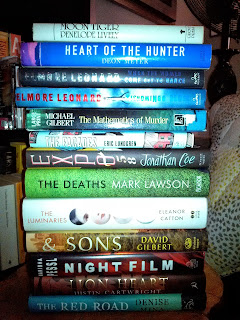As someone who reads a lot, I always pay attention to what the news has to say about the latest developments in the study of reading. Three recent stories caught my attention and I think it is pretty clear how one of these stories is all the evidence you would ever need to see to support the other two.
The magazine Science just published a study which claims that reading literary fiction improves one's theory of mind. From the editor's summary in Science:
Theory of Mind is the human capacity to comprehend that other people hold beliefs and desires and that these may differ from one's own beliefs and desires. The currently predominant view is that literary fiction—often described as narratives that focus on in-depth portrayals of subjects' inner feelings and thoughts—can be linked to theory of mind processes, especially those that are involved in the understanding or simulation of the affective characteristics of the subjects. Kidd and Castano (p. 377, published online 3 October) provide experimental evidence that reading passages of literary fiction, in comparison to nonfiction or popular fiction, does indeed enhance the reader's performance on theory of mind tasks.
I think that makes a lot of sense and I am glad that there is some evidence to support it.
And the journal PLOS ONE published something very similar:
How Does Fiction Reading Influence Empathy? An Experimental Investigation on the Role of Emotional Transportation
From the PLOS ONE abstract:
The current study investigated whether fiction experiences change empathy of the reader. Based on transportation theory, it was predicted that when people read fiction, and they are emotionally transported into the story, they become more empathic. Two experiments showed that empathy was influenced over a period of one week for people who read a fictional story, but only when they were emotionally transported into the story. No transportation led to lower empathy in both studies, while study 1 showed that high transportation led to higher empathy among fiction readers. These effects were not found for people in the control condition where people read non-fiction. The study showed that fiction influences empathy of the reader, but only under the condition of low or high emotional transportation into the story.
So, two serious studies which contend that perhaps reading fiction makes you a better person - or perhaps better able to relate and understand other people - which, I would argue, helps you to be a better person. Most readers probably love to read whether or not it is good for them so explaining the benefits of reading is for the most part preaching to the choir.
However
I was reading the Guardian the other day and I saw this headline:
(Ask yourself: who are the angriest pop musicians around? I bet he's in the top three of every list.) He goes on at length about how he hates reading stuff that isn't true and it occurred to me, that if there ever is a person who could benefit from spending more time reading fiction, its him. (Note: He has created a lot of great music and some of the anger and rage he feels has been put to some good use musically. But still, I think at this point in his career, he could do with some reading therapy. Especially since what he claims about reading fiction is now proving to be scientifically unsound.)

